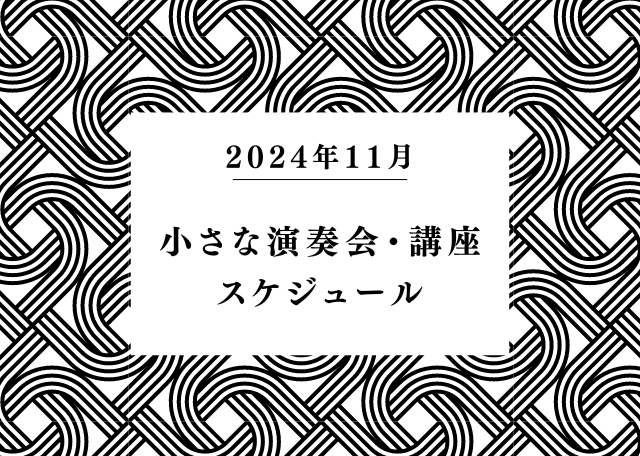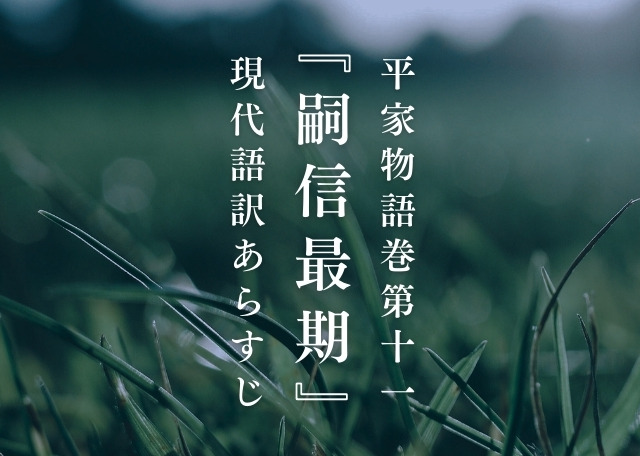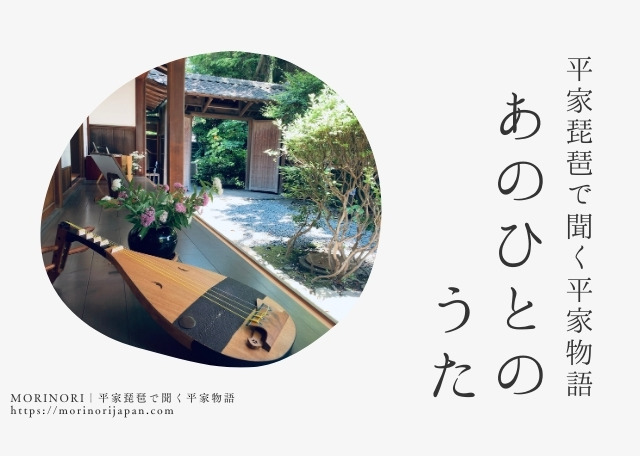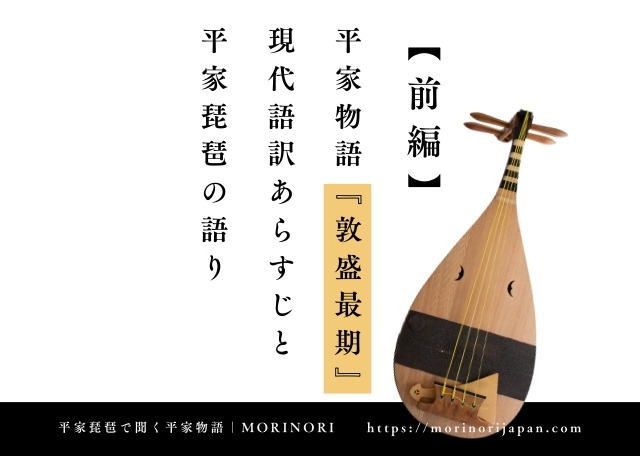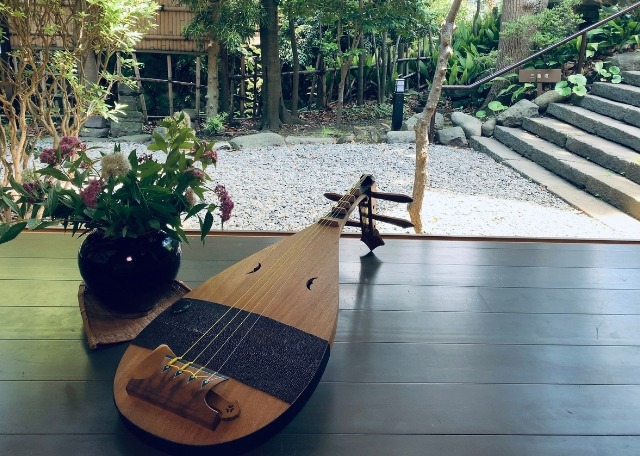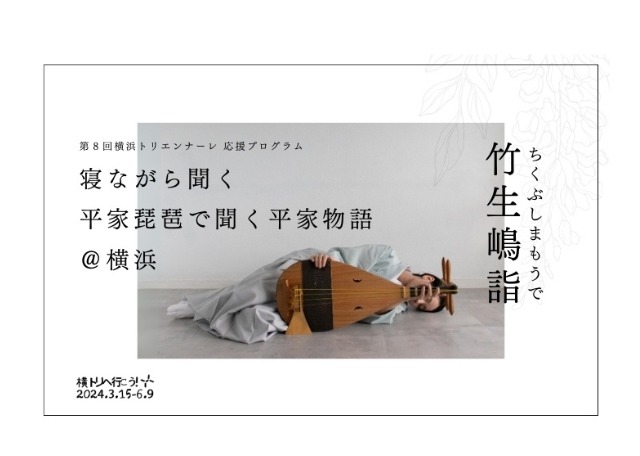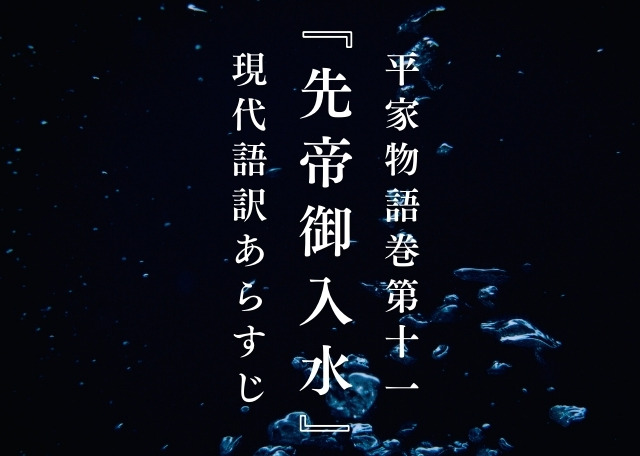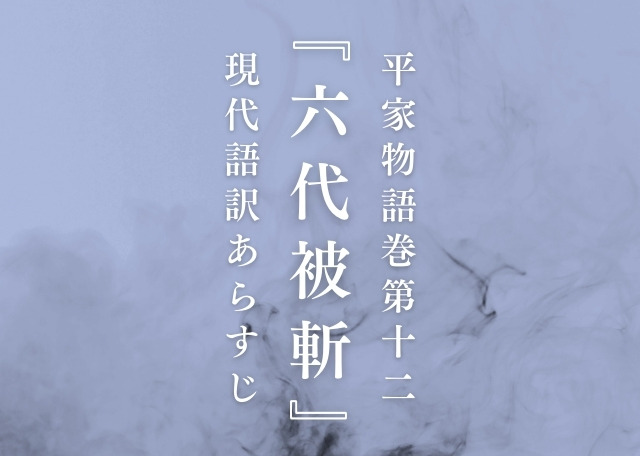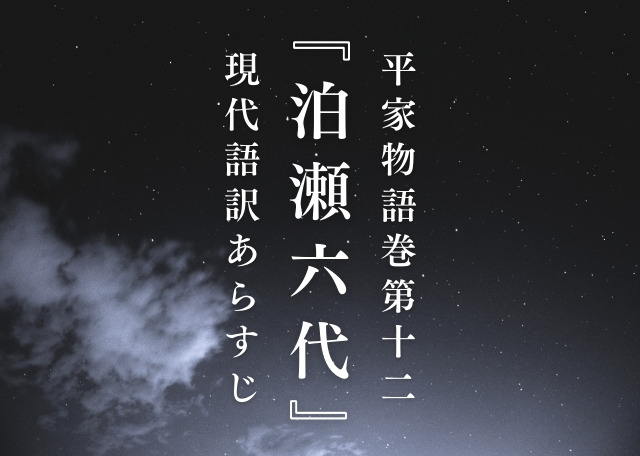Welcome to our site.
This is the website of MORINORI, which holds small Heikyoku (a performance of the Heike Monogatari accompanied by the Heike biwa) concerts and lectures. On this page, we introduce a modern translation of the Heike Monogatari, Volume 11, “Sakaro”. It’s not very good, but please take a look if you like.
▼For first-time visitors
https://morinorijapan.com/en/welcome
▼Program introduction
https://morinorijapan.com/en/performance-lineup
▼Listen to Heikyoku
https://morinorijapan.com/en/watch-the-sound/
▼Click here for a list of modern translations of the Tale of the Heike
The Tale of the Heike is performed at concerts and lectures, etc., in modern Japanese translation.
https://morinorijapan.com/en/category/tale-of-the-heike-en/
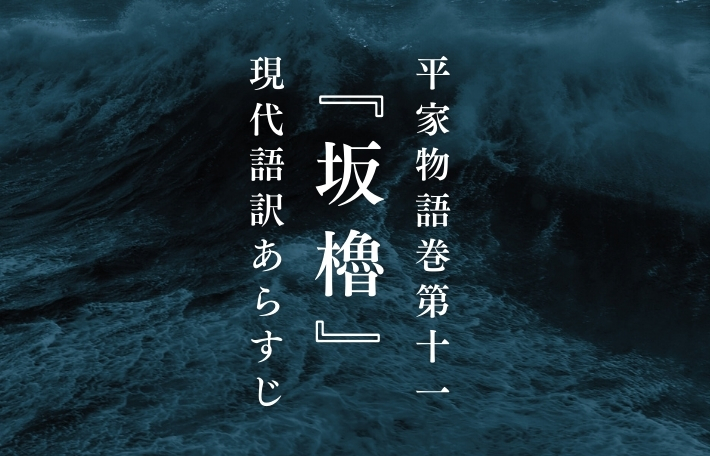
Heike Monogatari, Volume 11, “Sakaro” – A Brief Summary
On the 10th day of the first month of the second year of Genryaku, Kurohōgan(Yoshitsune) visited the court and, through the Minister of Finance Yasunori, reported to the ex-Emperor that the Heike had already been abandoned by the gods and the Emperor, and were now mere outcasts adrift on the sea, but that they had not been defeated in the three years since. Yoshitsune swore that he would not return to the capital unless he hunted down and defeated the Heike clan, driving them as far as Kikai, Korea, India and China. The ex-emperor was greatly moved by this, and ordered that a decisive battle be fought as soon as possible.
Yoshitsune received his orders and gathered his ships in Watanabe, Settsu Province, and began preparations to march on Yashima. Meanwhile, his older brother, Minamoto no Noriyori, also left the capital on the same day and prepared to attack the Heike clan. However, although preparations for departure were complete, a strong north wind blew violently and the ships were unable to set sail, requiring repairs.
On February 16, as preparations for departure were being made again, the daimyo and minor lords of the eastern provinces gathered together to discuss the strategy for the naval battle. Kajiwara no Kagetoki suggests that they should erect a reverse-rudder to make the ships easier to steer, but Yoshitsune rejects the idea. Kajiwara advises that they should be flexible in their approach, but Yoshitsune insists that the important thing is to advance and win, and a tension develops between them.
After repairing the boats and holding a celebration, Yoshitsune loaded them with rice and horses and pressed them to set sail. However, the boatmen hesitated, citing the strong winds. Yoshitsune, enraged by this, ordered them to set sail, saying, “If you don’t set sail, I will have you shot.” In the end, the five boats crossed the distance that would normally take three days in just three hours, and arrived in Awa.
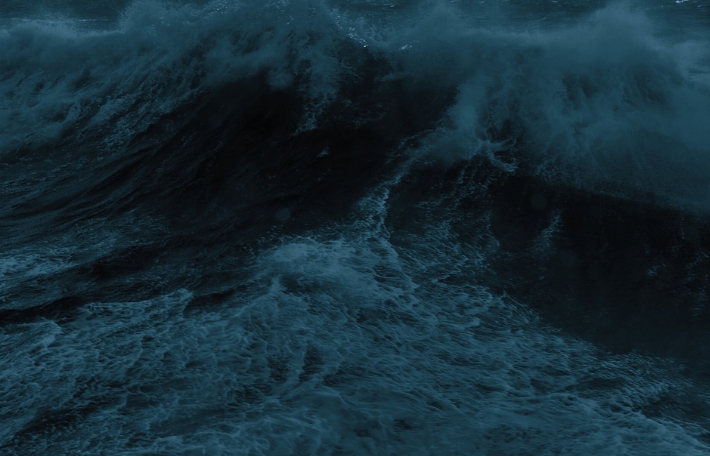
The Tale of the Heike, Volume 11, “Sakaro” – Full modern translation
*This is a modern translation of the text taken from the Heikyoku score “Sakaro”.
On the 10th day of the first month of the second year of Genryaku, Kurodaibu Hougan(Yoshitsune) paid a visit to the court and presented his report through the Minister of the Treasury, Yasunori Asomi. The content of the report was that the Heike clan had already been abandoned by the gods and the emperor, and were now castaways adrift on the sea, but despite this, they had been unable to conquer the enemy for three years, and were blocked in many countries, and this was a matter of concern. This time, Yoshitsune reported that he would not return to the royal castle (the capital) unless he hunted down and defeated the Heike clan in Kikai, Korea, India and China. The ex-emperor was greatly moved by this, and ordered, “We must swiftly decide the outcome of this battle, day and night.”
Hougan(Yoshitsune) accepted the order with humility and, after returning to his lodgings, he addressed the daimyo and minor lords of the eastern provinces, saying, “This time, Yoshitsune will be going to the western provinces to pursue the Heike clan on behalf of the Kamakura Shogunate. Therefore, we should pursue and attack the Heike as far as our horses can take us on land, and as far as our oars and paddles can take us at sea. Those of you who are dissatisfied or have objections should promptly go down to Kamakura.”
Well, the months passed quickly after the Heike crossed over to Yashima, and before they knew it, it was already the third year since the New Year had come and gone, the spring grass had withered, the autumn wind was blowing, and the spring grass was sprouting again. Rumors spread that tens of thousands of new troops from the eastern provinces were gathering in the capital to attack, and news also arrived that the Usuki, Totsugi, and Matsuura clans from Chinsai were joining forces to attack. Each time I heard this, my ears would be startled and my heart would be consumed, and I could do nothing else.
The ladies-in-waiting, including the Empress Dowager, the Lady-in-waiting of the North, and the ladies-in-waiting of Niidono and below, gathered together and lamented, “How much more suffering will we have to endure, and how much more pain will we have to suffer?” Among them, Lord Tomomori, the new middle councillor, said, “The people of the eastern and northern provinces received the Heike’s kindness, but they forgot their gratitude and followed Yoritomo and Yoshinaka. I was prepared for the western provinces to betray us in the same way, but I thought that if we stayed in the capital, we would be able to do something about it. However, it is not just a matter for me alone, and I am truly frustrated that we have to go through such hardship.” His words made sense, and I felt sorry for him.
On the 3rd day of the 2nd month, Kurodaibou Hougan(Yoshitsune) left the capital and gathered his ships at Watanabe Fukushima in Settsu Province, preparing to attack Yashima. On the same day, his older brother, Minamoto no Noriyori, also left the capital, assembling his fleet at Kanzaki in Settsu Province and preparing to march along the Sanyo Road. On the 10th, a government envoy was sent to Ise-Iwashimizu, where he was ordered to pray for the safe return of the Emperor and the three sacred treasures to the capital, along with officials from the Department of Worship and shrine priests. After that, the fleet that had been prepared in Watanabe and Fukushima was about to cast off its moorings to set sail. However, a fierce north wind blew, damaging the fleet and preventing it from setting sail, so it was decided to stay there that day to make repairs.
On the 16th of the second month, the daimyo and minor lords of eastern Japan gathered at Watanabe to discuss the fact that the preparations for the naval force were not complete. Kajiwara stepped forward and suggested that “we should put reverse oars on the ships for this campaign”, but Yoshitsune asked “what are reverse oars?”. Kajiwara explained, “Horses can move forward and backward, but it is difficult for ships to do so. We should put oars on the stern and bow, and use the oars to turn the ship in any direction easily.” Yoshitsune responded, “It is unlucky to think about retreating from the start. The ideal for an army is to advance and not retreat. What’s more, there’s no point in making preparations to escape. You can put up as many reverse oars or turning oars as you like on the ships of the other lords, but Yoshitsune will go on the original oars.”
Kajiwara piled on more words, saying, “A good general is one who advances when he should advance, and retreats when he should retreat, and destroys his enemies while preserving his own life. A person with a one-sided way of thinking is called a hot-headed warrior, and will never be a good general.” Yoshitsune replied, “I don’t know anything about boars or deer. All I know is that it feels good to attack the Heike and win.” The lords and lesser lords of the eastern provinces were afraid of Kajiwara after this exchange, and although they did not laugh out loud, they suppressed their laughter with their eyes and noses. On that day, there was a tense atmosphere between Yoshitsune and Kajiwara, but in the end, it did not come to a military confrontation.
Yoshitsune saw that the repaired boats had been made new, and ordered that a celebration be held for each one. He then loaded the boats with rice and provisions, placed the weapons in them, and ordered the horses to be saddled, saying, “Get the boats ready quickly.” The boatmen and helmsmen then advised him, “The wind is favorable, but it may be a little too strong. There is probably more wind blowing out at sea.” Hearing this, Yoshitsune became furious and said, “Should we stay put in the boats just because the wind is strong out at sea? Whether we die in the mountains or drown in the sea, it is all due to our karma from a previous life. If we are crossing against the wind, that’s one thing, but to not set sail at such a critical time because the wind is a little strong is unthinkable. Prepare the boats quickly. If anyone neglects to do so, shoot them all down one by one.” he ordered sternly.
The mighty warriors who responded with “Yes, sir!” – Sato Saburobei Tsugunobu, Shirobei Tadanobu, Genzo Eta, Taro Kumai, and Benkei Musashibo – drew their arrows in one hand and ran between the boats, saying, “This is the order of Lord Yoshitsune. “Get the boats out now. If you don’t, I’ll shoot each of you dead.” The boatmen and helmsmen said, ‘Being shot dead here is the same as dying out at sea in the wind. Then let’s go out to sea and die.’ From the 200-odd boats, only five set off. The five boats were Hougan(Yoshitsune)’s boat, Tashiro no Kanja’s boat, Goto no Hyoue and his son’s boat, Kaneko no Kyoudai’s boat, and the boat of the boat supervisor, Yodo no Enouchi Tada Toshi. The remaining boats did not set off, either out of fear of Kajiwara no Kagetoki or out of fear of the wind.
Hougan(Yoshitsune) said, “Just because there are no other boats out here, that doesn’t mean we should stay put. If it were just a normal time, the enemy would be on their guard and would be preparing for us. But in such a huge storm and with such huge waves, we can only attack the enemy in an unexpected place and defeat them.” He then ordered the remaining boats to light bonfires and ”make Yoshitsune’s boat the main boat and protect the fires at the bow and stern. If they see many fires, the enemy will be afraid and on their guard.” As a result, they covered the distance that would normally take three days in just three hours. They set off from Watanabe Fukushima in Settsu Province at the hour of the ox on the 16th of the second month, and arrived in the land of Awa at the hour of the rabbit the next day.
▼Click here for a list of modern translations of the Tale of the Heike
*The Tale of the Heike is performed at concerts and lectures, etc., in modern Japanese translation.
https://morinorijapan.com/category/tale-of-the-heike/
Thank you for reading this far.
I hope to see you somewhere someday.

